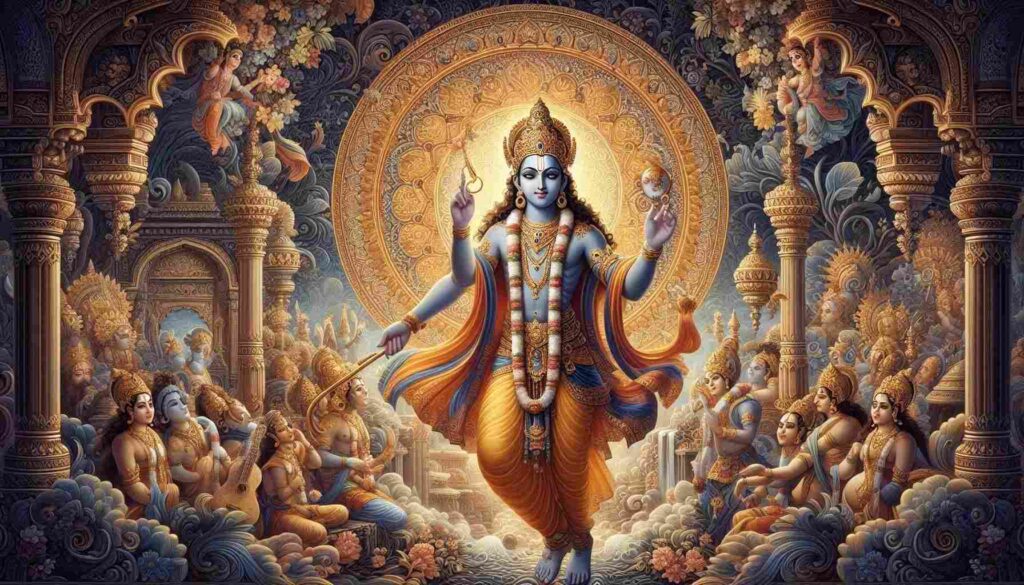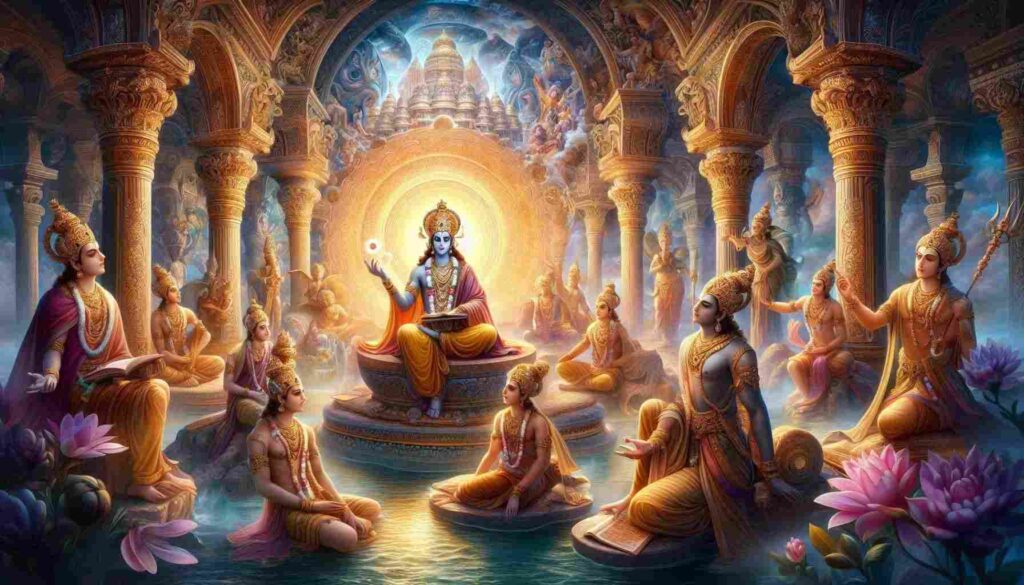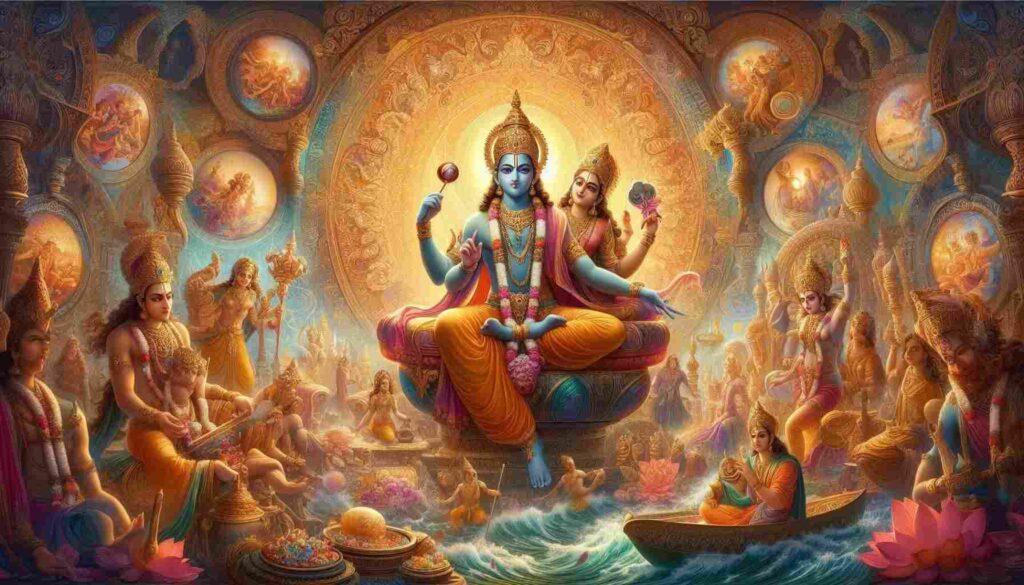
Madhava: The Divine Manifestation of Vishnu in Hinduism
Introduction to Madhava
Madhava, a revered form of Lord Vishnu, holds a significant place in Hinduism, symbolizing various divine attributes such as compassion, love, and wisdom. The name “Madhava” itself is rich in meaning—derived from “Madhu,” which translates to honey or sweetness, and “Va,” meaning knowledge or bliss. Thus, Madhava is often interpreted as the “Sweet Lord,” a deity who embodies the sweetness of divine love and grace.
Read More About Hindu Philosophy
Madhava is a name commonly used to address Lord Vishnu in his various incarnations, particularly Krishna. This form of Vishnu is associated with the season of spring and renewal, symbolizing fertility, prosperity, and the renewal of life. As an epithet of Krishna, the name Madhava appears frequently in sacred texts like the Mahabharata, Bhagavad Gita, and various Puranas, signifying Vishnu’s connection with nature and divine wisdom.
The Meaning of “Madhava” in Sacred Texts

The name Madhava appears extensively in Hindu scriptures, reinforcing its spiritual importance. In the Bhagavad Gita, Krishna is often addressed as Madhava, a term that denotes his eternal and all-encompassing nature. When Arjuna refers to Krishna as Madhava during the discourse, it signifies Krishna’s divine wisdom and his connection to both the mortal and immortal worlds.
In the Vishnu Sahasranama (The Thousand Names of Vishnu), Madhava is celebrated as one of the thousand manifestations of the Supreme Being, encapsulating various forms of the Lord that represent his grandeur. The Mahabharata and Srimad Bhagavatam also make frequent references to Madhava, emphasizing his roles as the protector of the cosmos and the destroyer of evil.
The usage of Madhava as a name highlights Vishnu’s role in preserving and sustaining the universe. It denotes Vishnu’s connection to nature, particularly his association with the Earth, seasons, and the cyclical nature of time, making him the embodiment of life and renewal.
The Role of Madhava in the Bhakti Tradition

Madhava plays a central role in the Bhakti movement, a devotional tradition that emphasizes personal devotion to a deity as a means of spiritual liberation. Devotees of Madhava, particularly in his form as Krishna, often express their love and devotion through music, poetry, and dance. Saints like Meera Bai, Tulsidas, and Surdas dedicated their lives to singing the glories of Madhava, emphasizing his accessibility and his boundless love for his devotees.
Madhava’s connection to the Bhakti movement is especially prominent in Vaishnavism, the sect of Hinduism that worships Vishnu and his avatars as the Supreme Being. In this tradition, Madhava is not only a protector but also a divine lover, a friend, and a guide who helps devotees transcend the material world and attain spiritual bliss.
Madhava in Different Forms of Worship
Madhava is worshipped in various forms and festivals across India, each representing a different aspect of his divine nature. One of the most prominent forms is that of Krishna, where Madhava symbolizes divine love and the playful, enchanting nature of God. The festival of Janmashtami, which celebrates the birth of Krishna, is one of the most significant celebrations where Madhava is worshipped. Temples across India, especially in Mathura and Vrindavan, become centers of devotion as millions gather to commemorate Krishna’s birth.
In South India, the worship of Madhava is linked to Vishnu in his form as the preserver of the universe. Temples dedicated to Lord Madhava often depict him holding a conch shell and a discus, symbols of his protection and his role in maintaining cosmic order. One such famous temple is the Sri Madhava Perumal Temple in Chennai, Tamil Nadu, where devotees worship Madhava as an eternal protector.
In other forms, particularly in spring festivals like Holi, Madhava is revered as a deity of renewal and fertility. Holi, the festival of colors, celebrates the arrival of spring, and through it, the renewal of life. As Madhava is deeply connected to this season, his worship is infused with a sense of joy, renewal, and the promise of divine love blossoming in the hearts of devotees.
Symbolism and Iconography of Madhava
The iconography of Madhava is varied, but certain elements remain constant across depictions. As an avatar of Vishnu, Madhava is often portrayed with four arms holding the traditional symbols: the Sudarshana Chakra (discus), the Panchajanya Shankha (conch shell), the Kaumodaki Gada (mace), and the Padma (lotus flower). Each of these items holds profound symbolism.
- The Chakra represents the cyclical nature of time and Vishnu’s ability to destroy evil.
- The Shankha symbolizes purity and the cosmic primordial sound of “Om.”
- The Gada stands for power and protection, reminding devotees that Madhava is the guardian of Dharma.
- The Lotus signifies purity, detachment, and spiritual enlightenment.
In his Krishna form, Madhava is often depicted playing the flute, surrounded by cowherds and gopis (milkmaids), symbolizing his role as a divine lover. The flute represents the divine call that beckons every soul to return to its spiritual roots, while the surrounding figures emphasize the intimate relationship between God and his devotees.
Festivals and Rituals Celebrating Madhava
Madhava is at the heart of several major Hindu festivals, with devotees celebrating him through rituals, prayers, and devotional songs. Some of the most notable festivals include:
- Janmashtami: Celebrated with great fervor, especially in Mathura and Vrindavan, this festival marks the birth of Lord Krishna (Madhava). Devotees fast, sing devotional songs, and reenact scenes from Krishna’s life.
- Holi: Known as the festival of colors, Holi celebrates the arrival of spring and the playful side of Madhava, particularly his divine play (Leela) with Radha and the gopis. It is a festival filled with joy, where devotees immerse themselves in vibrant colors, music, and dance.
- Vasant Panchami: This festival marks the beginning of spring and is closely associated with Madhava as the deity of renewal and fertility. Devotees offer prayers to Vishnu (Madhava) and celebrate the season’s bounty with songs and rituals.
- Ekadashi: Occurring twice a month, Ekadashi is a fasting day dedicated to Vishnu. Devotees of Madhava observe a day of fasting and prayer, seeking his blessings for spiritual growth and worldly success.
- Krishna Leela: This is a dramatic performance of Krishna’s life and is particularly popular in regions like Uttar Pradesh and Maharashtra. Madhava’s playful, compassionate, and heroic aspects are depicted through theatrical performances, narrating the stories of Krishna’s childhood and youth.
Temples Dedicated to Madhava
Madhava is worshipped in many famous temples across India, with each temple offering unique insights into the deity’s worship. Some notable temples include:
- Sri Madhava Perumal Temple (Chennai, Tamil Nadu): One of the oldest temples in South India, it is dedicated to Madhava as an incarnation of Vishnu. The temple is renowned for its beautiful architecture and annual festivals.
- Madhava Temple (Cuttack, Odisha): This temple is another important pilgrimage site, where Madhava is worshipped as the preserver and protector. The temple hosts numerous festivals throughout the year, drawing devotees from all over India.
- Dwarkadhish Temple (Dwarka, Gujarat): As Krishna is synonymous with Madhava, the Dwarkadhish Temple is a major site of pilgrimage. It is believed that this temple stands at the site where Lord Krishna ruled as the king of Dwarka.
- Guruvayur Temple (Kerala): Dedicated to Krishna, this temple is a key site for Vaishnava devotees, particularly those in Kerala. Krishna in his Madhava form is revered through traditional rituals and festivals.
Teachings and Philosophical Insights
Madhava, as a manifestation of Vishnu, represents the eternal sustainer of the universe. His teachings, particularly those given to Arjuna in the Bhagavad Gita, form the foundation of Hindu philosophy. In his Madhava form, Krishna emphasizes the importance of righteousness (dharma), devotion (bhakti), and detachment from the fruits of action. Madhava’s role as both a protector and a guide underscores the concept of divine intervention in times of cosmic imbalance.
Conclusion
Madhava, as a form of Vishnu, is central to Hindu worship and spirituality. His presence in sacred texts, festivals, and temples reinforces his role as a deity who bridges the gap between the divine and the material world. Through his association with Krishna and the Bhakti tradition, Madhava continues to inspire love, devotion, and wisdom in the hearts of millions of devotees. His worship, rich in symbolism and steeped in tradition, remains a vital part of Hindu religious life.


